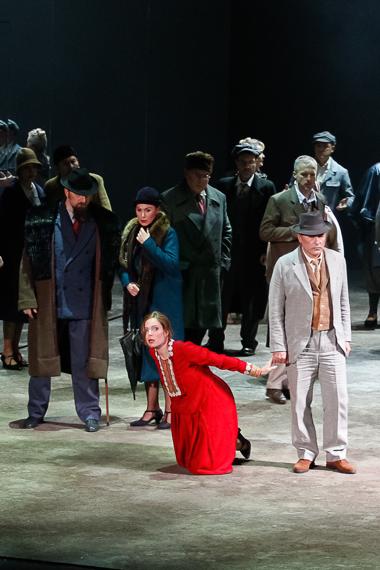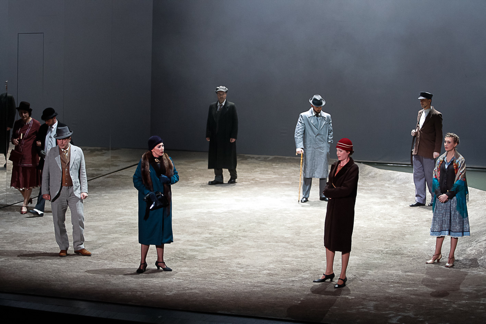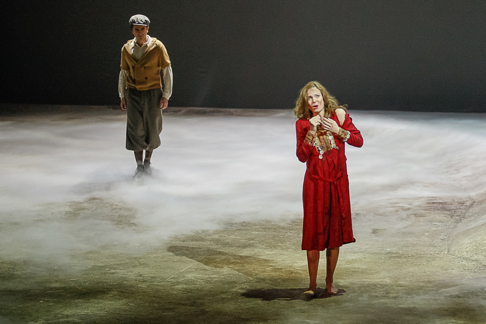
29 Jan 2015
Katia Kabanova in Toulon
Káťa Kabanová is, they say, Janáček's first mature opera — it comes a mere 20 years after his masterpiece, Jenůfa.
English Touring Opera are delighted to announce a season of lyric monodramas to tour nationally from October to December. The season features music for solo singer and piano by Argento, Britten, Tippett and Shostakovich with a bold and inventive approach to making opera during social distancing.
This tenth of ten Live from London concerts was in fact a recorded live performance from California. It was no less enjoyable for that, and it was also uplifting to learn that this wasn’t in fact the ‘last’ LfL event that we will be able to enjoy, courtesy of VOCES8 and their fellow vocal ensembles (more below …).
Ever since Wigmore Hall announced their superb series of autumn concerts, all streamed live and available free of charge, I’d been looking forward to this song recital by Ian Bostridge and Imogen Cooper.
The Sixteen continues its exploration of Henry Purcell’s Welcome Songs for Charles II. As with Robert King’s pioneering Purcell series begun over thirty years ago for Hyperion, Harry Christophers is recording two Welcome Songs per disc.
Although Stile Antico’s programme article for their Live from London recital introduced their selection from the many treasures of the English Renaissance in the context of the theological debates and upheavals of the Tudor and Elizabethan years, their performance was more evocative of private chamber music than of public liturgy.
In February this year, Albanian soprano Ermonela Jaho made a highly lauded debut recital at Wigmore Hall - a concert which both celebrated Opera Rara’s 50th anniversary and honoured the career of the Italian soprano Rosina Storchio (1872-1945), the star of verismo who created the title roles in Leoncavallo’s La bohème and Zazà, Mascagni’s Lodoletta and Puccini’s Madama Butterfly.
Evidently, face masks don’t stifle appreciative “Bravo!”s. And, reducing audience numbers doesn’t lower the volume of such acclamations. For, the audience at Wigmore Hall gave soprano Elizabeth Llewellyn and pianist Simon Lepper a greatly deserved warm reception and hearty response following this lunchtime recital of late-Romantic song.
Collapsology. Or, perhaps we should use the French word ‘Collapsologie’ because this is a transdisciplinary idea pretty much advocated by a series of French theorists - and apparently, mostly French theorists. It in essence focuses on the imminent collapse of modern society and all its layers - a series of escalating crises on a global scale: environmental, economic, geopolitical, governmental; the list is extensive.
For this week’s Live from London vocal recital we moved from the home of VOCES8, St Anne and St Agnes in the City of London, to Kings Place, where The Sixteen - who have been associate artists at the venue for some time - presented a programme of music and words bound together by the theme of ‘reflection’.
'Such is your divine Disposation that both you excellently understand, and royally entertaine the Exercise of Musicke.’
Amongst an avalanche of new Mahler recordings appearing at the moment (Das Lied von der Erde seems to be the most favoured, with three) this 1991 Mahler Second from the 2nd Kassel MahlerFest is one of the more interesting releases.
‘And there was war in heaven: Michael and his angels fought against the dragon; and the dragon fought and his angels, And prevailed not; neither was their place found any more in heaven … that old serpent … Satan, which deceiveth the whole world: he was cast out into the earth, and his angels were cast out with him.’
If there is one myth, it seems believed by some people today, that probably needs shattering it is that post-war recordings or performances of Wagner operas were always of exceptional quality. This 1949 Hamburg Tristan und Isolde is one of those recordings - though quite who is to blame for its many problems takes quite some unearthing.
There was never any doubt that the fifth of the twelve Met Stars Live in Concert broadcasts was going to be a palpably intense and vivid event, as well as a musically stunning and theatrically enervating experience.
‘Love’ was the theme for this Live from London performance by Apollo5. Given the complexity and diversity of that human emotion, and Apollo5’s reputation for versatility and diverse repertoire, ranging from Renaissance choral music to jazz, from contemporary classical works to popular song, it was no surprise that their programme spanned 500 years and several musical styles.
The Academy of St Martin in the Fields have titled their autumn series of eight concerts - which are taking place at 5pm and 7.30pm on two Saturdays each month at their home venue in Trafalgar Square, and being filmed for streaming the following Thursday - ‘re:connect’.
The London Symphony Orchestra opened their Autumn 2020 season with a homage to Oliver Knussen, who died at the age of 66 in July 2018. The programme traced a national musical lineage through the twentieth century, from Britten to Knussen, on to Mark-Anthony Turnage, and entwining the LSO and Rattle too.
With the Live from London digital vocal festival entering the second half of the series, the festival’s host, VOCES8, returned to their home at St Annes and St Agnes in the City of London to present a sequence of ‘Choral Dances’ - vocal music inspired by dance, embracing diverse genres from the Renaissance madrigal to swing jazz.
Just a few unison string wriggles from the opening of Mozart’s overture to Le nozze di Figaro are enough to make any opera-lover perch on the edge of their seat, in excited anticipation of the drama in music to come, so there could be no other curtain-raiser for this Gala Concert at the Royal Opera House, the latest instalment from ‘their House’ to ‘our houses’.
"Before the ending of the day, creator of all things, we pray that, with your accustomed mercy, you may watch over us."

Káťa Kabanová is, they say, Janáček's first mature opera — it comes a mere 20 years after his masterpiece, Jenůfa.
It is true that the Káťa Kabanová libretto is closer to The Makropoulos Affair and From the House of the Dead, sharing the brittle dramatic structures of these works and revealing the growing selfishness and emotional pessimism of the sixty-seven year old composer. But musically Káťa Kabanová seems spoken in the same voice that sings the emotional idealism of Jenůfa. Herein lies the challenge of producing Káťa Kabanová — it must hover between hope and hopelessness.
The Opéra de Toulon has just now presented this Janáček masterwork for the first time ever. It is a new production shared with the Opéra d’Avignon, thoughtfully and carefully directed by Nadine Duffaut. The set is by Emmanuelle Favre, a designer often utilized in the south of France, notably Orange, Marseille and Toulouse. Mme. Favre works in bold strokes, in big shapes and with few colors. Her décors are impressive, expressive and beautiful. As is the set for Káťa Kabanová.
 Set design by Emmanuelle Favre, costume design by Danièle Barraud
Set design by Emmanuelle Favre, costume design by Danièle Barraud
The stage was a huge white box, a full stage platform with period furniture on it hovered high above the stage floor, descending to create an interior or to provide shelter from the storm. The side walls were mirrorized making occasional flashes of the brightly colored costumes, like the sonic flashes of Janáček’s nervous orchestra. The Volga was a pool of real water, its splashes the visual echos of nerves on edge.
Family and business are the crushing forces in Káťa Kabanová. They are embodied in this suspended platform, and in the very presence of Kabanicha, the mother of Katia’s husband, sung by mezzo-soprano Marie-Ange Todorovitch. Mme. Todorovitch too is often on the stages in the south of France. She is a force of nature, her voice powerful, her presence riveting. Director Duffaut ended the opera with la Todorovitch standing front and center, triumphant in five intense beams of white light.
 Sébastien Lemoine as Kouliguine, Christina Carvin as Katia
Sébastien Lemoine as Kouliguine, Christina Carvin as Katia
The drowned Katia lies behind her. Portraying Katia is a vocal and dramatic tour de force, riding the cusp at all times between hope and despair. Franco-allemande soprano Christina Carvin possesses the idea colors — the slavic warmth of tone, a maturity of tone that forebodes, and a freshness of sound that breathes life. Mlle. Carvin made a powerful Katia. This young artist now sings regularly at the Vienna Staatsoper.
Katia’s young lover Boris was sung by Czech tenor Ladislav Elgr with sufficient vocal prowess to indulge in the manic love fantasies of Katia, but never to allow his character to lose its sense of defeat. In the beautifully directed scene when Katia publicly admits her infidelity he hovered in the background, then fled, and after his final moments with Katia near the end of the opera he simply evaporated.
The complementing personalities of Janáček’s slavic world, named below, were perfectly cast, notably Icelandic tenor Elmar Gilbertsson who sang Kudriach, some of it while riding the obligatory Jenůfa bicycle, and some of it skipping stones across the pool of water.
If this fine effort by the Opéra de Toulon did not create the full impact of Janacek’s brief opera it came close. While the tempos effected by Australian conductor Alexander Briger seemed appropriate and easily managed by the singers, the sounds coming from the pit sometimes seemed labored. It was apparent that the maestro was working closely with the orchestra but even so the boil of Janáček’s orchestral continuum did not always take flight.
Michael Milenski
Casts and production information:
Katia: Christina Carvin; Boris: Ladislav Elgr; Kabanicha: Marie-Ange Todorovitch; Dikoy: Mikhail Kolelishvili; Tichon: Zwetan Michailov; Varvara: Valentine Lemercier; Kudriach: Elmar Gilbertsson; Kouliguine: Sébastien Lemoine; Glasa: Caroline Meng. Chorus and orchestra of the Opéra de Toulon. Conductor: Alexander Briger; Mise en scène: Nadine Duffaut; Décors: Emmanuelle Favre; Costumes: Danièle Barraud; Lumières: Jacques Chatelet. Opéra de Toulon, March 27, 2015.